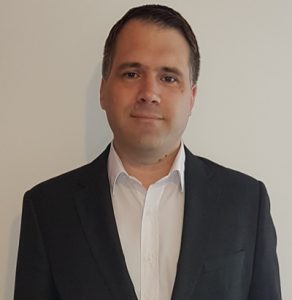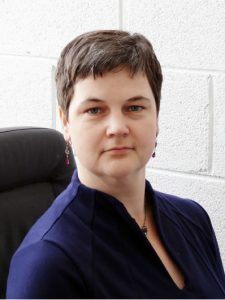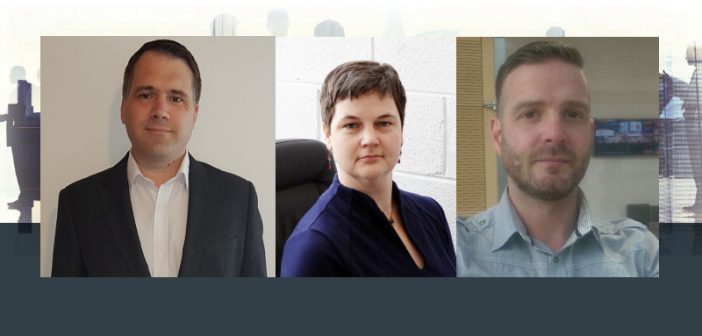Presenters from industry and academia talk to BIMIreland.ie about the upcoming CitA BIM Gathering in Galway’s Galmont Hotel on 26th September and tell us about their papers and presentations. #CitABIMGathering
Frederic Lefebvre, Project Quantity Surveyor, Mercury Engineering

Frederic graduated from Dublin Institute of Technology in 2015, with a BSc in Quantity Surveying and Construction Economics, and achieved a first-class honours MSc in Applied Building Information Modelling and Management at Technical University Dublin in 2019. He has a keen interest in Early Contractor Involvement, Integrated Project Delivery and collaborative procurement methods which are the subject of the research he will be presenting at this year’s BIM Gathering.
What is the title of your paper?
An investigation into current procurement strategies that promote collaboration through early contractor involvement with regards to their suitability for Irish public work projects.
What company are you with?
I currently work for Mercury Engineering as a quantity surveyor and this research was carried out as part of my MSc in aBIMM at Technological University Dublin.
What is the focus of your paper presentation?
The focus of the research is on Early Contractor Involvement (ECI) and how it could be more widely implemented on public works projects in Ireland. ECI is widely reported to increase innovation, promote collaboration within the project team and improve quality, sequencing and buildability while offering better cost certainty and risk management.
Why is this an important topic in digital construction?
Previous research has established that multi-disciplinary collaboration will benefit a construction project throughout its lifecycle. While Lean Construction, Building Information Modelling (BIM), and Integrated Project Delivery (IPD) can all be viewed as separate processes which add independent value to a project, they are more effective when used in partnership with each other. In order to ensure the high levels of collaboration expected for these processes to work in unison, the early involvement of the contractors is paramount. The National BIM Council Roadmap to Digital Transition for Ireland’s Construction Industry 2018-2021 warns about the risk of the digital transition stalling if more collaborative ways of working together are not found. Therefore, I feel it is critical that ECI forms part of the review of procurement policy for public works projects launched by the Minister for Finance and Public Expenditure and Reform in March 2019, and that Ireland follows the international trend of the development of more collaborative procurement methods and contracts.
Have you attended the Gathering or CitA events in the past?
I have attended the Gathering in 2017 and several events of the CitA Digital Transformation Series. I really enjoyed the last Gathering. You learn a lot from what others have done or are doing, you get an insight into what’s coming down the line and it’s a great networking event with representants from all sectors.
What are you most looking forward to at the CitA BIM Gathering in Galway?
Looking at the programme, it looks to me like it will be the best Gathering yet. The challenge will be to select which presentation to see! I look forward to seeing my colleagues from the MSc aBIMM in TUD presenting their capstone papers. They all have very interesting topics that should spark some great debates.
As a QS, I am also happy to see that many presentations will be on the subject of quantity surveying. I feel that, as a profession, quantity surveyors have previously been a bit slow to engage on the topic of BIM and digital transformation. However, this is changing so I hope I can see many Quantity Surveyors and people in commercial roles attending the conference and engaging with the various speakers.
I also look forward to seeing the new “toys” and technology on display. The technology is advancing at such a pace; it is amazing to see what we can achieve now and how much we can push the boundaries using these tools. Lastly, the Gathering is also a great place to hear about the future of the industry and how we can prepare for it. The digital transformation is happening whether people like it or not. No better place to start your BIM and digital journey than at the BIM Gathering.
Dr Avril Behan, Head of the School of Multidisciplinary Technologies, Technological University Dublin

Avril is a Chartered Geomatics Surveyor and holds a PhD in the application of geomatics to architectural historical studies. The integration of Lean Construction with BIM is also an area of special interest and links with Avril’s role as a Director of Lean Construction Ireland. Avril is TU Dublin’s Lead Investigator on the EU-funded BIMCert project which is producing training materials to enable construction personnel at all levels to utilise BIM to achieve EU Buildings Directive energy targets.
She chairs the Society of Chartered Surveyors Ireland BIM inter-professional working group, is vice-chair of SCSI’s Geomatics Profession Group and is a Member of both the UK and Irish BIM academic fora. She is also a member of the buildingSMART (bSI) UKI steering committee for the development of the UKI bSI Professional Certification Programme in Open BIM. Avril is a member of the Royal Academy of Ireland’s Geosciences & Geographical Sciences Committee for the 2018 – 2021 term.
What is the title of your paper?
Academia – Estates Management Synergies in HEIs – The Low Hanging Fruit.
What is the focus of your paper presentation?
Building Information Modelling (BIM) adoption within Higher Education Institutes (HEIs) in Ireland through the creation of a local mutually beneficial partnership to share knowledge and improve teaching methods and administrative support services.
Why is this an important topic in digital construction?
BIM could improve relevant functions of academics and estates management/administrative support services within HEIs in Ireland. For a HEI to not actively explore and realise the potential benefits that BIM can offer, when HEIs in Ireland already possess the knowledge and expertise, is undoubtedly currently a wasted opportunity.
Have you attended the Gathering or CitA events in the past?
Yes, in 2015 and 2017. Excellent event and very well organised.
What are you most looking forward to at the CitA BIM Gathering in Galway?
Meeting like-minded people and sharing my research.
Peter Mc Donnell, Estates Project Manager and Client BIM Manager, Dublin City University

While employed at TCD, Peter was responsible for composing the university’s first Employers Information Requirements (EIR) and Supply Chain Capability (SCCS) documents and led the HEI’s information management for its first Level 2 maturity BIM capital project, the new €70m Trinity Business School (TBS) development. Peter composed TCD’s first BIM documents with the vision of utilising them on all future capital projects which would be procured using Level 2 BIM. Peter has continued on from this and has composed DCU’s first suite of BIM documents and is currently leading BIM implementation for the HEI while also being responsible for the information management role on two other large capital developments, DCU’s Glasnevin Campus Student Residences and the Future Tech Building.
Peter’s MSc research is helping to inform DCU’s Estates Office plan to support academic areas of the HEI, through delivery of state-of-the-art innovative living laboratory spaces and the installation and use of sensors and interactive user interfaces, for the communication of building systems data for utility and service usage and environmental quality monitoring that can be used to support collaboration between academic functions (education and research) and administrative support/operational functions (estates and facilities management, energy, sustainability etc.) and planning and development of a smart digital campus in line with DCU’s strategic plan.
What is the title of your paper?
Academia – Estates Management Synergies in HEIs – The Low Hanging Fruit.
What is the focus of your paper presentation?
Building Information Modelling (BIM) adoption within Higher Education Institutes (HEIs) in Ireland through the creation of a local mutually beneficial partnership to share knowledge and improve teaching methods and administrative support services.
Why is this an important topic in digital construction?
BIM could improve relevant functions of academics and estates management/administrative support services within HEIs in Ireland. For a HEI to not actively explore and realise the potential benefits that BIM can offer, when HEIs in Ireland already possess the knowledge and expertise, is undoubtedly currently a wasted opportunity.
Have you attended the past Gatherings?
Yes, in 2015 and 2017. Excellent event and very well organised.
What are you most looking forward to at the CitA BIM Gathering in Galway?
Meeting like-minded people and sharing my research.
#CitABIMGathering
Follow BIMIreland.ie on Twitter, LinkedIn and Instagram for industry news and views.




